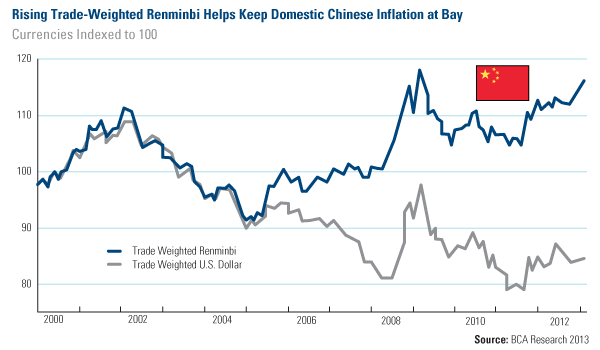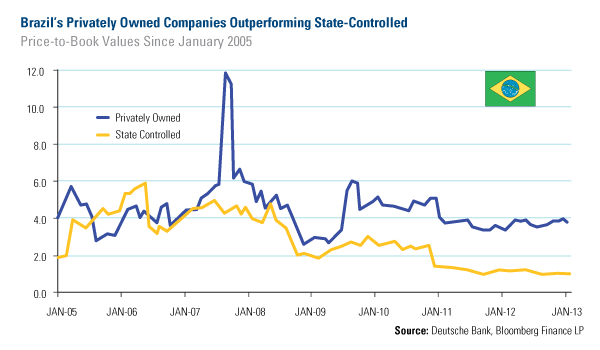Emerging Markets Radar (March 4, 2013)
Strengths
- The China Securities Regulatory Commission said there is no time table for resuming public offerings, Xinghua reports, citing an unidentified official with the regulator.
- China’s Power Industry Group expects Chinese power consumption to rise between 6.5 to 8.5 percent in 2013, and GDP to rise between 7.5 to 9.5 percent. Many analysts believe there will be more policies to come out from two March conferences in Beijing for wind and solar subsidies, due to severe pollution in Beijing and elsewhere in China, which made clean energy a policy a priority.
- China Internal Capital Corporation’s (CICC) property analyst Eric Zhang, believes Chinese property policy risks have largely been priced in. The current sector valuation has a 45 percent discount to the NAV, and 7.6 times 2013 estimated earning per share and one time price to book ratio, which seem very attractive.
- Macau’s February gaming revenue was up 11.5 percent, better than the market expectation.
- Thailand’s February inflation softened to 3.23 percent lower than 3.39 percent in previous months and better than expected 3.3 percent by the market. Food prices fell during the month. Also in Thailand, January exports were up 16.1 percent higher than both previous months and market expectation, which are 13.45 and 13 percent, respectively. Imports were up 41 percent; in particular gold imports were up 133 percent causing a wider trade deficit than the previous month.
- Korea’s January industrial production went up 7.3 percent year-over-year, though down 1.5 percent month-over-month and exports were down 8.6 percent, better than the estimate of down 9.2 and 10.9 percent in the previous month. The economic trend is stabilizing.
- The Philippines expanded broad money (M3 money supply) by 10.6 percent in January after a 10.6 percent rise in December, which facilitated nominal GDP growth.
- A recent survey by Frontier Strategy Group showed that a majority of its more than 200 multinational clients report Latin America is their most profitable emerging market region. On average, Frontier’s clients report 55 percent higher operating margins than in Russia, China and India. The rising middle class demand for more and better products, together with demand factors that allow for setting comfortable operating margins and the realization of economies of scale, have propelled the region into its current position.
Weaknesses
- The HSCI China flash PMI was 50.4 versus consensus 52.2 for February. China’s official February PMI was 50.1, lower than the estimate of 50.5, due to the effect of the Chinese New Year. The number indicates weaker recovery in a cyclical upturn economy and may, therefore, push back any attempt of monetary tightening by the central bank.
- China has announced five policies to curb housing prices overnight after market close in Hong Kong and China, which included a housing price target, purchasing restrictions, higher down payment and interest rate on second home purchases, transaction stamp duty taxes, and roll-out of property taxes to more cities. China International Capital Corporation’s (CICC) analysts say these measures are consistent with the summary from the state council meeting last week, and would not expect material impact on the primary property market where developers belong. Nevertheless, the new policy proposed a 20 percent capital gain tax on existing home sales, which will stir a huge debate and may not be welcome among the home owners.
- The People’s Bank of China (PBOC), the central bank, did not inject money into the economy this week after net withdrawal last week.
- In Hong Kong, the government doubled stamp duty to curb property speculation due to rising housing prices. The new stamp duty taxes can go as high as 8.5 percent for property valued at more than 20 million Hong Kong dollars.
- Indonesia’s February inflation was 5.3 percent, higher than consensus 4.8 percent and previous 4.6 percent. The increase was primarily caused by soaring food prices and import quota on beef and live cattle during the flood in the month.
- Brazil reported Q4 GDP growth of 0.6 percent slowing fiscal year 2012 GDP growth to 0.9 percent. Growth has slowed for two consecutive years now, and places Brazil significantly behind its major emerging market peers. The central government has lowered benchmark rates to record lows, depreciated the real, and pressured banks to extend lending without tangible success. A lack of clarity on fiscal policy guidance and exaggerated government intervention will continue to undermine investor confidence.
Opportunities

- As shown in the BCA Chart above, due to strengthening U.S. dollar and weakening yen and euro, the trade-weighted renminbi is rising. The appreciating renminbi makes imported goods cheaper and helps slow down inflation at a time when global central banks are increasing money supply.
- Canada’s Foreign Minister made a diplomatic mission to Latin America last week in an effort to boost economic and diplomatic relations with a region that has shown resiliency in a time of global recession. The visit is seen as a reinforcement of Canadian Prime Minister Stephen Harper’s “re-engagement in our hemisphere” policy; a Canadian recognition of the fact that more investment in the region is warranted as Latin American states have begun to adopt a posture of economic expansion into other dynamic economies on their Pacific Ocean side.
- Chancellor Angela Merkel of Germany arrived in Turkey this week for talks with Prime Minister Recep Tayyip Erdogan, holding out hope for new impetus in the stalled negotiations for the country to join the European Union.
Threats
- Increasing total social financing, in addition to global monetary easing in the U.S., Japan and Europe, has caused the PBOC to worry about inflation risk. The recent news had it that China may tighten money supply slightly by raising bank reserve ration for some selected banks. Today’s new housing tightening policies may cause real estimate investment and property transactions to slow, which can be directly negatively impact demand in materials and household items.
- There is a new round in the Paul Singer vs. Argentina scuffle, where the country is attempting to overturn a November 2012 ruling to pay $1.33 billion to the 2001 default holdout creditors. President Fernandez has vowed not to repay holdout investors more than the 30 cents on the dollar paid to other debt holders in two previous restructurings, regardless of the court’s verdict. If the previous ruling is upheld, Argentina will have difficulties in re-routing its debt servicing payments, as banks will avoid the risk of being deemed to be in contempt of court. Buenos Aires’ Merval Index is down 15 percent from its 2013 highest levels.
- Sectors which are perceived to be relatively free of government intervention in Brazil are standing at massive valuation premiums to the rest of the markets, which leads Deutsche Bank to be wary of the Brazilian consumer sector in particular.

Copyright © U.S. Global Investors











